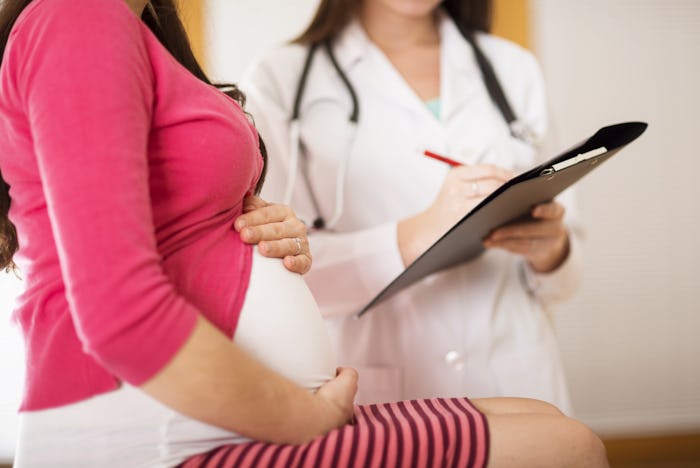Life

How Can Certain STIs Affect Your Pregnancy
Although it may seem scary, being diagnosed with a sexually transmitted infection (STI) before conceiving allows you the opportunity to talk to your doctor about whether treatment is needed or not. But there's no need to worry if you're unsure whether or not you have an STI since your health care provider not only screens you for them, but also explains what STIs can affect your pregnancy. Having this knowledge early on is best, since treatments are safe and effective at managing these conditions during pregnancy.
Even if you're feeling on top of your health game, it doesn't hurt to ask for STI testing at a prenatal visit. If something is lurking, the earlier you start treatment, the less likely you and your baby are to have complications, according to the March of Dimes. As the website fort Baby Center explained, some STIs raise your risk of miscarriage, preterm premature rupture of the membranes (PPROM), preterm birth, uterine infection, and stillbirth and can pass to the baby via the placenta or during delivery when bodily fluids are exchanged. Taking steps to properly diagnose and treat these eight STIs can lead to a healthier pregnancy and baby.
1Gonorrhea
Although gonorrhea is a treatable infection, you could have an ectopic pregnancy if it flares up during pregnancy , according to the American Pregnancy Association. As Planned Parenthood's website explained, an ectopic pregnancy "happens when a fertilized egg implants outside of the uterus." If you know you are a carrier for gonorrhea, talk with your OB as soon as you know you're pregnant in order to work out a preventative treatment plan.
2Chlamydia
If you know you have chlamydia, talk to your doctor as soon as you discover you're pregnant. As Baby Center pointed out, quick treatment of chlamydia lowers the risk of infection of the amniotic sac and fluid, preterm birth, and preterm premature rupture of the membranes, all of which tend to be higher for pregnant women with this STI.
3Trichomoniasis
If you haven't been tested for trichomoniasis before pregnancy, be on the lookout for vaginal itching and pain when peeing or having sex. Knowing you have this STI when pregnant is important since trichomoniasis can lead to premature birth and low birth weight, as the website for the March of Dimes explained.
4HIV
Understanding exactly how to approach pregnancy while living with HIV is crucial to a healthy delivery and baby. According to the American Congress of Obstetricians and Gynecologists (ACOG), it is possible for HIV to pass to the baby through the placenta or during labor. However, by continuing to take anti-HIV medication, having a cesarean delivery, and giving your baby anti-HIV meds after birth, 99 percent of HIV-infected women will not pass HIV to their babies, as the ACOG explained.
5Herpes
Depending on how severe an outbreak occurs in the first trimester, herpes can lead to miscarriage, according to the American Pregnancy Association. But this virus can also cause damage further into pregnancy if not treated properly. If herpes is passed to the baby during pregnancy (known as neonatal herpes) the result can be premature birth and low birth weight, as the medical journal, American Family Physician, explained.
6HPV
According to Healthline, in rare cases, genital warts from HPV could be so large that they block the birth canal, meaning they would need to be removed before delivery or your doctor will recommend a cesarean delivery. However, this is not common and most women with HPV have uncomplicated births.
7Syphilis
Treatment of syphilis during pregnancy is crucial in order to prevent the STI from passing to the placenta or baby, as the Centers for Disease Control and Prevent (CDC) explained. If not treated, the risk for premature labor and fetal distress in the second half of pregnancy increases.
8Bacterial Vaginosis (BV)
As Fit Pregnancy reported, "BV can cause problems during pregnancy like premature labor, late miscarriage and premature rupture of membranes." But the good news is, most women with BV will not have these side effects. The antibiotics used as part of prenatal regime will safely manage the infection.